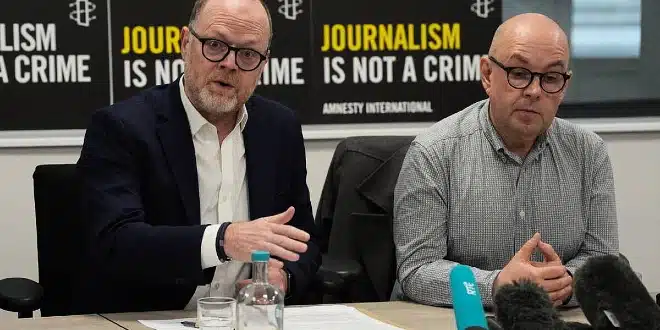A tribunal has ruled that a covert surveillance operation, authorized by a Northern Ireland police chief to identify a journalistic source, was unlawful.
The Investigatory Powers Tribunal (IPT) invalidated the decision by former Police Service of Northern Ireland (PSNI) chief constable George Hamilton, who had approved a Directed Surveillance Authorisation (DSA) during an investigation into a leaked confidential document that was featured in a documentary about a Troubles massacre.
As a result of this ruling, the tribunal awarded £4,000 in damages each to journalists Barry McCaffrey and Trevor Birney, who were found to have been unlawfully surveilled by UK authorities. The IPT also examined claims that the PSNI and the Metropolitan Police had unlawfully accessed McCaffrey’s phone data in unrelated investigations in 2013 and 2012. Both forces had already admitted the unlawfulness of these actions.
McCaffrey and Birney were controversially arrested in 2018 during a police investigation into the alleged leak of a document included in their documentary on the 1994 loyalist paramilitary massacre in Loughinisland, Co Down. The PSNI, citing a conflict of interest, had requested Durham Police to lead the investigation into the document’s appearance in the film “No Stone Unturned.”
Following a court ruling that the warrants used to search the journalists’ homes and their film company, Fine Point Films, were inappropriate, the PSNI apologized and agreed to pay £875,000 in damages to the journalists and the film company.
In 2019, Birney and McCaffrey lodged a complaint with the IPT to determine if there had been any unlawful surveillance against them. During tribunal proceedings, it was revealed that a detective had requested the DSA from Hamilton to monitor if the reporters would contact their source after their release from custody. Hamilton approved the surveillance of an individual suspected of leaking the document.
The IPT declared the DSA unlawful and emphasized that a declaration alone would not suffice to address the claimants’ rights under Article 10 of the European Convention of Human Rights. Birney and McCaffrey called for a public inquiry into the police’s surveillance practices.
Conservative MP David Davis, who supported the journalists, described the IPT’s decision as significant and joined calls for a public inquiry. Davis stressed the responsibility of the UK government and Northern Ireland Secretary Hilary Benn to address the matter thoroughly.
PSNI Chief Constable Jon Boutcher acknowledged the tribunal’s judgment, emphasizing the need for lawful, proportionate, and accountable use of surveillance powers. Boutcher mentioned that while officers acted in good faith, the 2013 authorization for accessing communications data was a breach of human rights obligations. He pledged to consider the judgment and the findings of an independent review to ensure the PSNI’s practices align with legal standards.
 The Daily Star Ireland
The Daily Star Ireland

